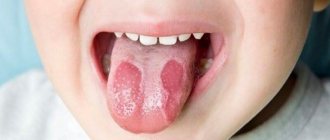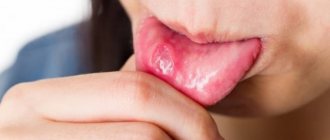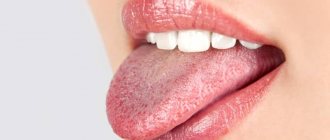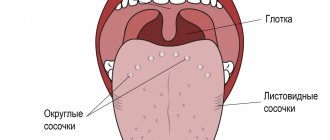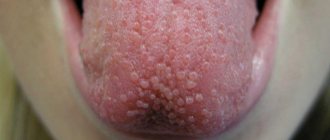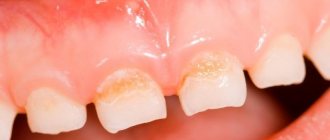Stomatitis: features of the disease
Stomatitis is a disease related to dental pathologies in which inflammation of the oral mucosa occurs. Infection of the tongue with stomatitis in adults is also called “glossitis.”
The inflammatory process affects the mucous membrane and causes severe symptoms:
- redness and swelling of the tongue;
- formation of white plaque;
- severe pain;
- the formation of many small blisters and ulcers.
Due to severe sensitivity and soreness of the tongue, the patient cannot eat food, fever, insomnia and irritability are possible.
Stomatitis under the tongue in adults, as in other parts of the oral cavity, is classified into two types.
- Aphthous. A form of inflammation in which the tongue becomes covered with papules and ulcers that turn into erosions (aphthae).
- Herpetic. The inflammatory process is manifested by swelling and redness of the tongue. Small bubbles are localized in groups.
Prosthetic stomatitis and ulcerative-necrotic form of pathology are extremely rare.
Without treatment, the signs of stomatitis completely disappear, but this does not mean that the patient is cured of the pathology. The inflammatory process becomes chronic and when the immune system is weakened or exposed to an irritant, a relapse occurs.
Vincent's ulcerative necrotizing stomatitis
One of the reasons that the tongue hurts on the side is Vincent's ulcerative necrotizing stomatitis. With this disease, ulcers appear in the oral cavity, which can be located not only directly on the tongue, but also on the mucous membrane of the cheeks, and even spread further:
- on the gums;
- sky;
- tonsils.
The disease is caused by bacteria: spirochetes and fusobacteria. What is especially characteristic of this pathology is that the ulcers are covered with a dirty gray coating. Vincent's ulcerative-necrotizing stomatitis is treated locally with antimicrobial drugs. Broad-spectrum antibiotics are also prescribed.
Causes of stomatitis
Stomatitis under the tongue in adults is a reaction of the immune system to certain types of irritants, which are any substances. The causes of stomatitis have not been clearly identified; presumably, the body exhibits an individual reaction to certain substances or microorganisms.
Possible causes of stomatitis on the tongue in adults:
- bacteria and infections of the oral cavity (caries, gingivitis, periodontitis, etc.);
- diseases of the gastrointestinal tract of an infectious or viral type;
- respiratory diseases (ARVI, influenza, etc.);
- frequent injury to the tongue by orthopedic or orthodontic structures;
- damage to the tongue due to a chipped tooth;
- fungal infection;
- bad habits (smoking or alcoholism);
- burning the tongue or eating “spicy” foods.
In addition to the listed causes of stomatitis on the tongue in adults, inflammation of the mucous membrane can be caused by the herpes virus (herpetic stomatitis).
Why does it occur
Stomatitis on the tongue is caused by bacteria, viruses, and fungi that live in the oral cavity. These can be pathogenic and conditionally pathogenic microorganisms that begin to actively multiply as a result of decreased immunity or jaw injuries.
Any person has a huge number of bacteria on the mucous membranes of the tongue. Under normal conditions, they do not cause harm and do not cause any complications. This is due to the fact that saliva contains a special antiseptic component - lysozyme, which does not allow bacteria to actively spread.
With a decrease in the body's defenses and trauma to the tissues of the tongue, infection occurs. Lysozyme ceases to cope with the function of suppressing bacterial and viral agents. Then wounds appear that do not heal for a long time.
Infectious lesions of the mucous membranes
The human tongue is an ideal place for bacteria and viruses to multiply. But saliva exhibits harmful activity and does not allow the latter to spread. If the salivary glands do not function at full capacity, the content of harmful organisms increases. This happens with diabetes, dysbiosis, and severe dehydration.
If there are too many bacteria, a white or yellowish coating forms on the tongue. Soon, ulcers of an infectious nature form. Bubbles can also form, which burst and merge with each other, turning into voluminous painful erosions.
Injuries as a provocateur of illness
In some people, stomatitis is a consequence of constant trauma to the membranes of the mouth from the braces. Damage can also be a consequence of an incorrect bite - for example, if, due to an anomaly, a person very often bites the tip of his tongue.
It has been noticed that the disease more often develops in people who eat solid foods that have sharp edges (lollipops, crackers, etc.). Injury to mucous membranes and broken crowns of teeth.
Poor oral hygiene is a contributing factor to the problem.
More often, people who do not pay due attention to oral hygiene need treatment. Typically, they rarely brush their teeth, do not undergo routine dental examinations, and do not use dental floss or mouthwash.
It is very bad if a person eats unwashed vegetables and fruits or has the bad habit of biting nails and foreign objects. All this aggravates the already imperfect hygiene and increases the risk of infection of microcracks on the surface of the tongue.
Diseases of the gastrointestinal tract are the culprits of stomatitis
You can tell a lot about the features of the gastrointestinal tract by looking at the language. If the mucous membrane of an organ often becomes inflamed and becomes painful, doctors suspect the presence of ulcers, gastritis, colitis, etc.
In such a situation, self-medication is prohibited. The patient needs to consult both a dentist and a gastroenterologist.
Stomatitis as a symptom of helminthic infestation
The studies carried out made it possible to establish that tissue irritation is sometimes the result of the activity of worms living in the human body. The presence of worms can be suspected if the tissues of the oral cavity are covered with small ulcers at intervals of thirty to forty days.
Allergy is the cause of the disease
In allergy sufferers, inflammatory mouth disease is more common. Relapses occur after using certain foods, cosmetics, medications, toothpastes and various hygiene products.
If there is an assumption that the disease is a consequence of individual intolerance to any compound, the use of any formulations containing it should be excluded. During periods of exacerbation, it is necessary not only to relieve inflammation that appears in the mouth, but also to take antihistamine tablets prescribed by an allergist.
Intoxication causes illness
In some people, the disease appears in response to poisoning by some toxic elements. Sometimes one dose of a poisonous drug is enough to then suffer from relapses for a long time.
Intoxication occurs when inhaling fumes of paint, varnish, low-quality household chemicals, or after using a number of building materials. People who work with chemical fertilizers, dangerous cleaning solutions and gels are especially at risk of encountering it.
Treatment Basics
If an adult has a swollen tongue, the surface is covered with plaque, or has severe hypothermia, you should consult a dentist. Even in the absence of neoplasms in the oral cavity in the form of papules, ulcers or erosions, a specialist will be able to determine the development of the inflammatory process. With timely treatment, the risk of pathology becoming chronic is minimal.
Treatment of stomatitis on the tongue in adults is carried out exclusively conservatively. Depending on the causes of the disease and the clinical picture, the doctor will determine a treatment regimen and prescribe effective drugs of systemic and local action.
The dentist’s task is not only to eliminate symptoms and inflammation, but also to identify the cause. If the provoking factor has a constant impact, then stomatitis under the tongue will constantly recur.
Treatment of stomatitis on the tongue in adults begins with the relief of concomitant diseases - the root causes.
Catarrhal glossitis
If the tongue hurts on the side and a white coating covers its surface, then this is most likely catarrhal glossitis - a special case of this disease. It can be considered as a symptom of other pathologies. In particular, it is called:
- caries;
- stomatitis;
- gastrointestinal diseases;
- various infections (measles, diphtheria, etc.).
In addition to pain and plaque, symptoms of catarrhal glossitis include swelling of the tongue and a burning sensation, which is especially worse after eating or talking. The disease is treated by eliminating its causes and rinsing the mouth with antiseptic solutions.
How is the treatment carried out?
Treatment for stomatitis is comprehensive.
- Anesthesia. To eliminate pain, the dentist may prescribe topical medications containing lidocaine or analgesics.
- Antiviral therapy. If the disease is caused by a herpes virus, the doctor prescribes antiviral drugs of the appropriate group of effects.
- Antibacterial therapy. In case of bacterial stomatitis, local treatment of the oral cavity with antiseptic solutions and dental ointments with antibacterial action is mandatory.
- Antifungal therapy. Stomatitis can be the result of fungal activity in the mouth. This form is more common in children, but is not excluded in adults. The specialist prescribes the patient a strict regimen of antifungal drugs.
- Anti-inflammatory therapy. It is carried out in cases of severe inflammation. The dentist recommends taking anti-inflammatory systemic drugs that have a targeted effect depending on the pathogen or cause of tongue stomatitis.
- Diet. Patients with stomatitis are prescribed a diet that excludes foods that can aggravate irritation of the mucous membrane and tongue. So dentists recommend avoiding hot, spicy, sour and salty foods. Smoking and drinking alcohol should be avoided.
Together with the treatment of stomatitis, treatment of diseases of the respiratory system, gastrointestinal tract, inflammation of the gums, caries, etc. can be carried out.
Tongue injuries
Another reason why the tongue hurts on the side lies in mechanical injuries to the organ. They occur when eating food with sharp parts (seeds, nuts, undercooked cereals), hitting, or biting. Damage can occur due to a seizure, sports, falls, or various accidents.
If you are absolutely sure that the soreness is the result of an injury, then you just need to give the tongue time to recover. Nevertheless, examination by a specialist to clarify the diagnosis and treatment will not be superfluous.
General recommendations
For stomatitis in adults, treatment is carried out on an outpatient basis. The dentist can perform initial treatment of the oral cavity, then the patient will need to perform all the manipulations independently at home.
Antiseptic treatment of the entire oral cavity is a prerequisite for the successful treatment of stomatitis and the rapid recovery of the affected mucosa. For “disinfection”, solutions containing chlorhexidine, furatsilin or metronidazole are used. Dentists also recommend rinsing with a soda solution every 2-3 hours.
Locally in the affected areas, it is necessary to remove heavy plaque using gauze and apply anti-inflammatory and regenerating gels or ointments to the areas where ulcers accumulate. The procedure is unpleasant, but significantly speeds up recovery.
Treatment of stomatitis on the tongue in adults, subject to all prescriptions and recommendations of the dentist, takes no more than 10 days. Symptoms of the disease disappear after 3–5 days; a few more days are required to restore the affected tissues.
Signs of deviations from the normal state of the tongue
It is quite possible that, once you look at your tongue, you will see a rather unsightly picture. Symptoms of deviation from the norm:
- A coating of various colors, thicknesses, and with different locations of spots appears on the back of the tongue;
- The sides of the tongue are bright red;
- The taste buds look uneven, some of them increase in size and begin to disturb with unpleasant sensations, taste sensations change, their intensity weakens;
- The oral cavity becomes unusually dry;
- In some cases, the appearance of pain and burning is diagnosed;
- There is an unpleasant odor from the mouth;
- After cleaning the tongue, the plaque appears again after a short time.
In the plaque that appears on the tongue, laboratory testing can reveal leukocytes, pathogenic microflora, and exfoliated epithelial cells.
This video will tell you about plaque on the tongue due to gastritis:
Papillomas
A complication of the papilloma virus can cause a sore on the tongue. The warts themselves are not dangerous, but you need to avoid damaging them. This threatens the appearance of a malignant neoplasm.
Do not confuse papillomas with genital warts. The latter are much more dangerous. They are often injured, thereby infecting other adjacent areas of the skin. The regular appearance of condylomas indicates a person’s predisposition to cancer.
